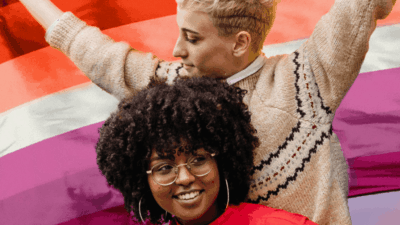
Lesbians need more than 24 hours of visibility
Since 2008, lesbians like me have been embracing the day of 26 April - Lesbian Visibility Day.
It’s 24 hours where our community comes together to celebrate and commemorate the achievements of a group of people which has for so long been marginalised.
Two years ago, I came to the conclusion that a single day for lesbian visibility was simply insufficient. We needed, and deserved, more time to shine a light on some of the amazing women in our community, and to celebrate who we are without fear of prejudice, harassment or vilification. As the publisher of DIVA, the leading magazine for LGBTQI women and non-binary people, I wanted to use our platform to create a unique space. I decided to look at extending the day to a week and, with the help of a brilliant team at DIVA Media Group, in less than two years the week has already become an unmissable event in the LGBTQI calendar.
Because DIVA is such an established brand – the magazine has been in print since 1994 – gathering support from other LGBTQI organisations was fairly straightforward. As a former board member for GLAAD, I was delighted when they became involved, alongside Stonewall, Kaleidoscope Trust, UK Black Pride, Albert Kennedy Trust, LGBT Foundation, Mermaids, the Peter Tatchell Foundation and many others.
Lesbians need to be given space to be visible and shown to the world on our own terms.
These organisations all agree that lesbians need to be given space to be visible and shown to the world on our own terms. For too long, we have been fetishised by the heterosexual male gaze, as little more than the stuff of fantasy. At the same time, a small number of cis lesbians, whose opposition to the rights of our trans siblings has become ever louder and more toxic, have led some to believe that the lesbian community is not an inclusive space. I can assure you that for the vast majority of us, this is not the case. That's why I am so committed to celebrating all under the LGBTQI umbrella this week.
I want us to use this time to not only celebrate our community, but to come together to uplift the L in LGBTQI. We must represent it as it is – an inclusive, diverse and joyful community full of people who continue to empower and support one another.
Among rumours that our numbers are being erased, the opposite is in fact true. Recent ONS figures show that young people more likely to identify as lesbian, gay or bi. In some disciplines, it is easier than ever for lesbians to be out and proud, and that is something to celebrate. The Visible 100 is indeed proof of that, featuring women and non-binary people from TV, comedy, politics, sport, business and more.
But still, in too many walks of life, LGBTQI women and non-binary people remain firmly in the closet. We often hear stories of those in music and film, for example, who are encouraged by management to suppress their gayness lest they sell fewer records or are refused auditions for straight roles. Go on – try to name five out, lesbian British actors: I think you’ll struggle.
I’ve long believed that IDAHOBIT – the International Day Against Homophobia, Biphobia and Transphobia – should surely be called IDAHOBLIT, to include lesbophobia. Women often experience a specific mix of misogyny and homophobia, which doesn’t fit neatly under the label of ‘homophobia’. We saw this back in 2019, when a same-sex couple were attacked on a London bus for refusing to kiss in front of a group of young men. This story struck a chord with me, and I'm sure with many other lesbians and bi women, who have experienced the prejudice behind this sort of attack.
This is a week for joy, to celebrate the progress that has been achieved.
But we must remember that this is a week for joy, to celebrate the progress that has been achieved. So we’re delighted to put on a huge range of panels and events, from our star-studded DIVA Awards, hosted by Adele Roberts and Kate Holderness with a performance from the iconic Heather Small, voice of M people, to Stonewall Presents GIGLESS, hosted by the fantastic Catherine Bohart.
It has become abundantly clear to me that having the platform of DIVA is a unique chance to embrace and nurture our diversity. At the start of the first UK lockdown, I created the DIVA Community on Facebook to help LGBTQI people stay connected during these unprecedented times.
I am delighted to have also used the DIVA platform to conduct a ground-breaking survey about LGBTQI women and non-binary people’s wellbeing. Some of the results were shocking, with 3 in 4 respondents reporting worse mental health due to the pandemic and subsequent lockdowns. I hope that now we have the results, we can use them to effect positive change.
There is so much more to do, but for this week it is important for us to honour, respect and uplift one another, and be truly proud of our lesbian identities. I, for one, will be simply delighted to hear the word ‘lesbian’ being said over and over again with absolute pride. Please join me and our allies in using the word ‘lesbian’ with pride this Lesbian Visibility Week.



